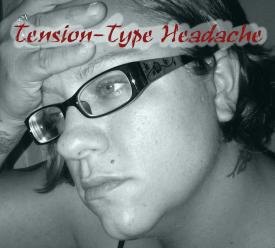Let’s Talk About Tension-Type Headache.
It’s often called the most common headache. It’s been labelled stress headache, or tension headache, but research has shown us that these headaches don’t tend to come from either stress or muscle tension.
 |
Just what a tension-type headache (TTH) is is still a bit of a mystery. We do know that the line between migraine and TTH isn’t as clear as most people think. Many people who think they just have a “normal” headache are actually suffering from migraine. And even those who really do have TTH may have a headache that has roots in common with migraine.
“Ordinary headache”, like migraine, seems to have a neurobiological basis. It’s diagnosed by the way it shows itself, not by what causes it. So a TTH will probably involve a “tight” pain, usually on both sides of the head, and it will lack typical migraine symptoms like nausea and sensitivity to light and sound.
Already someone out there is saying,”But wait – I am sensitive to light when I have a tension headache.” Guess what – you may have been misdiagnosed.
Treating Tension-Type Headache
The most important advice when it comes to TTH is this: see a doctor who takes your symptoms seriously. That’s it.
Why? Because the common course of action – take painkillers, take painkillers again, it’s just a headache – take more painkillers – is causing more problems than it’s solving.
First you need to get to a doctor and get a proper diagnosis. Is it really TTH? If so, what kind? Yes, there are various varieties of TTH which may call for different treatments. Is it mixed with other types of headache? If so, the treatment may be different.
Once you’re under the care of a doctor, common treatments include paracetamol / acetaminophen (Tylenol) and aspirin, depending on your symptoms and medical history.
In some cases, preventative medication may be required, at least for a time. This would include tricyclic antidepressants such as amitriptyline (Elavil, Endep, etc).
If you have more than one type of headache, other medications may be recommended.
Depending on the severity and frequency of your headaches, your doctor may also recommend lifestyle changes such as more activity and changes in your diet. Biofeedback has been shown to be beneficial for tension-type headache as well. Other complimentary treatments may help.
Remember, tension-type headaches are not normal, and they can be treated. They can be disabling, and significantly impact your day-to-day life. Don’t ignore them while they steal away bits of your life.
For more information:
- Do you have tension headache symptoms?
- Tension-Type Headaches (Cleveland Clinic)
- Management of tension-type headache (British Medical Journal)
